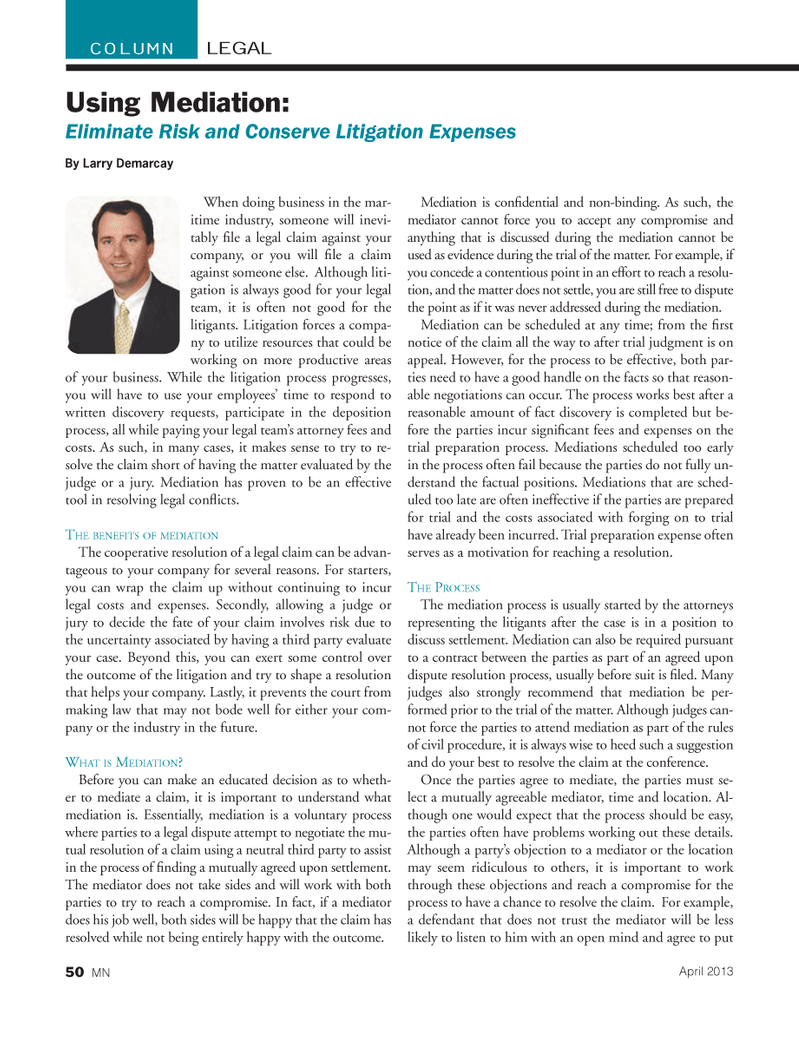
Page 50: of Marine News Magazine (April 2013)
Offshore Service Operators
Read this page in Pdf, Flash or Html5 edition of April 2013 Marine News Magazine
When doing business in the mar-itime industry, someone will inevi- tably Þ le a legal claim against your company, or you will Þ le a claim against someone else. Although liti-gation is always good for your legal team, it is often not good for the litigants. Litigation forces a compa- ny to utilize resources that could be working on more productive areas of your business. While the litigation process progresses, you will have to use your employeesÕ time to respond to written discovery requests, participate in the deposition process, all while paying your legal teamÕs attorney fees and costs. As such, in many cases, it makes sense to try to re- solve the claim short of having the matter evaluated by the judge or a jury. Mediation has proven to be an effective tool in resolving legal conß icts. THE BENEFITS OF MEDIATION The cooperative resolution of a legal claim can be advan- tageous to your company for several reasons. For starters, you can wrap the claim up without continuing to incur legal costs and expenses. Secondly, allowing a judge or jury to decide the fate of your claim involves risk due to the uncertainty associated by having a third party evaluate your case. Beyond this, you can exert some control over the outcome of the litigation and try to shape a resolution that helps your company. Lastly, it prevents the court from making law that may not bode well for either your com- pany or the industry in the future. WHAT IS MEDIATION ?Before you can make an educated decision as to wheth- er to mediate a claim, it is important to understand what mediation is. Essentially, mediation is a voluntary process where parties to a legal dispute attempt to negotiate the mu- tual resolution of a claim using a neutral third party to assist in the process of Þ nding a mutually agreed upon settlement. The mediator does not take sides and will work with both parties to try to reach a compromise. In fact, if a mediator does his job well, both sides will be happy that the claim has resolved while not being entirely happy with the outcome. Mediation is conÞ dential and non-binding. As such, the mediator cannot force you to accept any compromise and anything that is discussed during the mediation cannot be used as evidence during the trial of the matter. For example, if you concede a contentious point in an effort to reach a resolu- tion, and the matter does not settle, you are still free to dispute the point as if it was never addressed during the mediation. Mediation can be scheduled at any time; from the Þ rst notice of the claim all the way to after trial judgment is on appeal. However, for the process to be effective, both par- ties need to have a good handle on the facts so that reason- able negotiations can occur. The process works best after a reasonable amount of fact discovery is completed but be- fore the parties incur signiÞ cant fees and expenses on the trial preparation process. Mediations scheduled too early in the process often fail because the parties do not fully un- derstand the factual positions. Mediations that are sched- uled too late are often ineffective if the parties are prepared for trial and the costs associated with forging on to trial have already been incurred. Trial preparation expense often serves as a motivation for reaching a resolution. THE PROCESS The mediation process is usually started by the attorneys representing the litigants after the case is in a position to discuss settlement. Mediation can also be required pursuant to a contract between the parties as part of an agreed upon dispute resolution process, usually before suit is Þ led. Many judges also strongly recommend that mediation be per- formed prior to the trial of the matter. Although judges can- not force the parties to attend mediation as part of the rules of civil procedure, it is always wise to heed such a suggestion and do your best to resolve the claim at the conference. Once the parties agree to mediate, the parties must se- lect a mutually agreeable mediator, time and location. Al- though one would expect that the process should be easy, the parties often have problems working out these details. Although a partyÕs objection to a mediator or the location may seem ridiculous to others, it is important to work through these objections and reach a compromise for the process to have a chance to resolve the claim. For example, a defendant that does not trust the mediator will be less likely to listen to him with an open mind and agree to put Using Mediation:Eliminate Risk and Conserve Litigation Expenses By Larry Demarcay LEGALCOLUMNApril 201350 MNMN April2013 Layout 50-58.indd 50MN April2013 Layout 50-58.indd 504/2/2013 9:57:04 AM4/2/2013 9:57:04 AM

 49
49

 51
51
